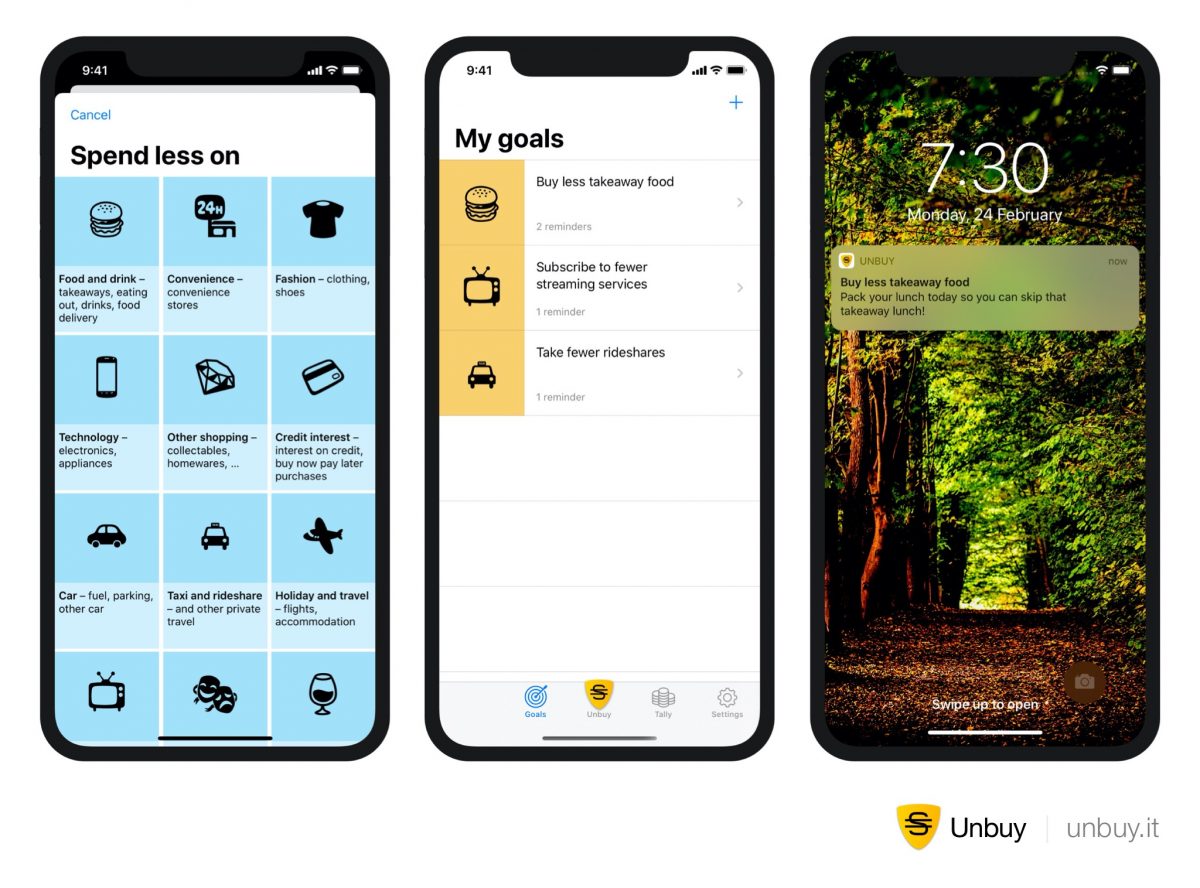Early last year, I was trying to figure out a way to help people reduce their personal material consumption and landed on a concept called Unbuy. Unbuy is a service that helps you set goals, reduce your impact, and save money by buying less.
Unbuy focuses on the first word of the ‘reduce, reuse, recycle’ mantra – reducing consumption at its core. Here’s how it works:
- Set your unbuying goal. What would you like to spend less on: food and drink, fashion, tech, travel or something else?
- Get reminders to unbuy: Unbuy reminds you to stop buying unnecessary things. This helps turn unbuying into a regular habit.
- Rather than buying something, you unbuy it and move the money into savings instead. You consume less, and over time your savings will add up.
Learn more on the Unbuy website and download Unbuy on the App Store. See also acknowledgements.
Table of Contents
Concept launch, interrupted
The initial public release of the early Unbuy concept was ready to go when the pandemic hit. Suddenly, it did not feel right to suggest that we should be buying less, when so many were doing that anyway, out of necessity. The pandemic is not over yet but maybe this new year is a good time to revisit the concept.
How has spending and saving changed during the pandemic? Are there new behaviours and dynamics to be found? How could these changes be harnessed to help people consume less, and less unsustainably? These and many other interesting questions are yet to be answered.
At this stage, Unbuy is an unproven concept but I would like to develop it further, or perhaps evolve these ideas into something else in the anti-consumption space. However, I am not quite sure how to best approach this and would like guidance from people working on similar themes. If this sounds like you, or you know of an individual or an organisation in this space, please get in touch.
Many open questions and challenges
The core concept of Unbuy is very simple, yet raises some interesting questions and challenges. Here are some of them:
What’s the reward in not buying or consuming? It is very hard to compete with the dopamine hit from ‘retail therapy’; the reward for not buying needs to be intrinsic. A core part of the Unbuy concept is to suggest an alternative to a particular type of consumption: instead of driving to work, perhaps you could ride a bicycle instead? Instead of buying lunch out, perhaps you could pack it at home? Whether these alternatives – and the associated savings – are sufficient to convince someone not to buy remains to be seen.
Isn’t saving just deferred consumption? Yes and no. In my view this is highly dependent on the time elapsed between the original non-purchase decision (‘unbuying’) and when the amount saved is ultimately spent. Perhaps, if we could entice people to defer consumption, this could become a habit and the barrier to consume would move higher. The amount saved could also be spent in a non-traditional way e.g. by donating it to social or environmental causes, which I would consider an investment rather than consumption.
Isn’t this just another savings goal app? Not really. Typically, savings goals are things that you save for: an expensive product, a holiday, a car, a renovation. This is consumption-focused mentality – your objective is what you want to acquire. Unbuy flips this and helps you focus on what you want to save from, not what you want to save for.
Wouldn’t something like this impact the income and livelihood of people in retail and service professions? If there was sufficient uptake and scale in a short period of time, yes. However, from another perspective, I believe reduction in high footprint consumption could drive demand towards products and services with lower footprint. If people reduce their consumption relatively slowly, as is likely, there will be sufficient time for the market to respond.
Isn’t Unbuy overly focussed on lifestyle and individual change? Yes, it is. In this respect it is similar to any number of ‘personal footprint calculators’ and ‘ethical buying apps’ that can be useful but do little to address the systemic problems (see ‘There’s No App for That’). To meaningfully respond to climate and environmental breakdown, we need to change the system. In isolation, individual change is not enough but it can help enable systemic change.
What if you can barely make the ends meet? Unbuy is focused on the relatively wealthy and reducing their excess consumption, not the essentials. That said, people have very different views on what is essential and what is aspirational; I have written about the difference between needs and wants previously. Although Unbuy offers several examples, it is up to the person using it to define their own goals and determine where they want to reduce.
How can you convince people not to buy when the multi-billion-dollar marketing and advertising machine is pushing for the opposite? This is the central question. Unbuy in its current form is simplistic and perhaps naïve but my hope is that it could be expanded towards something more meaningful. I firmly believe that part of the response to the environmental breakdown we are causing should be to not just consume ‘smarter’ or ‘more ethically’ but to consume less, and I am keen to explore ways to help people do this.
Seeking ideas and collaborators
Do you have thoughts, comments or suggestions on where to take Unbuy next? Please get in touch.
You can download Unbuy on the App Store. Thank you to everyone who has helped develop and refine this concept so far!
